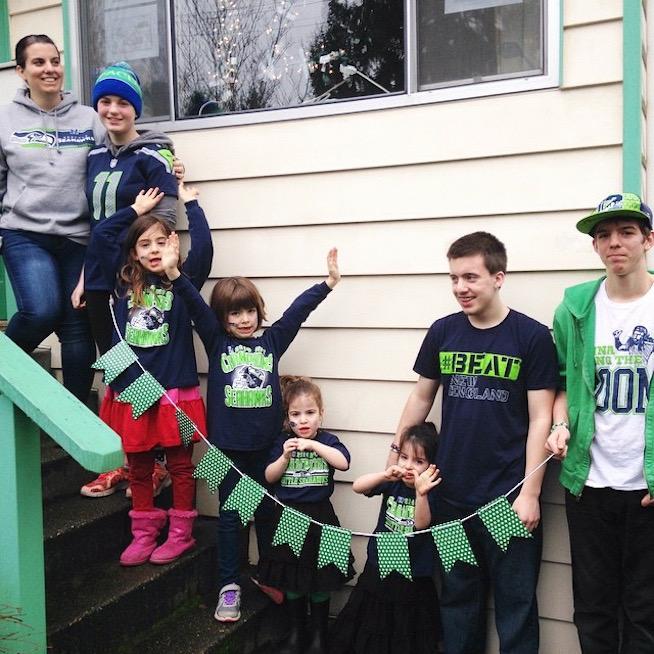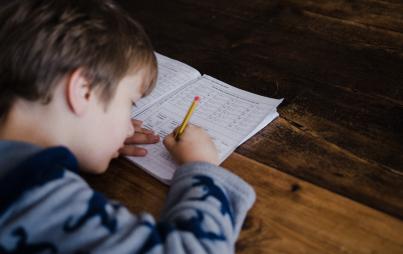
The author and her SEVEN CHILDREN.
When people learn that I have seven kids, ranging in age from 4 to 17, they usually have a lot of questions. When they find out that I have three sets of twins and a spare, and that I'm a single parent, minds are routinely blown. Generally, after they regain their composure, they suggest that I must be an "expert" at this parenting thing by now.
Some days, I agree with them. Other days, I'm still pretty much holding on for dear life while trying not to fuck my kids up too much along the way. Still, after all of these years, I've amassed at least some degree of parenting wisdom, and these are seven things I've learned along the way.
1. No One Will Care How You Fed Your Baby In High School — Including You
I threw my heart and soul into breastfeeding my oldest kids, but it simply didn't work. I felt like I failed them by eventually switching to formula, so when my younger twins were born I was determined not to give up. When I ran into the same issues, I visited lactation consultants, pumped on a rigid schedule, and even sought out donor breast milk to ensure that my daughters were fed breast milk almost exclusively until age 1.
At the time, I was determined to give my daughters the best. Now, I wish that someone had told me that what they needed most was a happy, relaxed mother who could cradle them in her arms and sing to them as she fed them instead of stressing out over pumping schedules and milk intake. The benefits of a secure attachment are lifelong, and my babies needed me to devote myself to their emotional development, not obsess over their dietary needs.
Although breast-or-bottle seemed so critical back then, as my children head into high school and even prepare for college, I realize how little those decisions actually impacted them. It is impossible for anyone to tell which of my kids were given formula versus breast milk, and I wish that I had been willing to accept that formula was a safe and healthy option for my younger kids, too.
2. You'll Never Please Everyone, So Stop Trying
From the old lady in the grocery store who asks whether your baby is warm enough to the other moms who subtly suggest that you really should consider everything from elimination communication to baby-led weaning, everyone will have an opinion about your parenting, and most of them will suggest you're doing it wrong.
It's easy to let the sanctimommy crowd get to you, and to feel like you need to rigidly adhere to a certain set of parenting beliefs. But the reality is that parenting is fluid and ever-changing, and what works for one person is a complete disaster for another. There is no one perfect parenting approach, and anyone who tells you that they have all of the answers is a lying liar who lies. Pick and choose what works best for you, change it up as needed, and don't be afraid to cut out the sanctimommies from your life.
3. Organization Is Far Less Important Than Time
One of the most common misconceptions people have about my household is that we must be extremely over-scheduled and hyper-organized. The reality is that I have a calendar on my phone, and meal plan once a week, and that's about it.
When my kids were younger, I had to make lists for my to-do lists. I even had minute-by-minute schedules for my day. While that was necessary to juggle the life we were living, it was a symptom of living an unsustainable life. My kids didn't need daily extracurricular activities, we didn't need to eat elaborate meals every night, and we definitely didn't need to shop at three grocery stores per week to score the absolute lowest prices. I have slowed down the tempo of our lives dramatically, and ditched the lists and schedules, and it's given us all more room to breathe.
4. Contributing To The Household Is As Important For Kids As Adults
I've never been a fan of the Duggar style of parenting where the older kids essentially raise their siblings, but I also believe that all children need to contribute to the household in meaningful ways. This means that my kids each have a daily chore, and that my teenagers cook one dinner each week and split the dishes every night. This has taught them a lot of great life skills, and it's also freed me up to focus my time and energies elsewhere.
While it can be completely exhausting to oversee kids' chores, particularly in the very beginning and again in the early teen years, it's still worth the effort for both the kids' development and your own sanity. It's OK to expect your kids to truly contribute, and it's even OK to enjoy it when they do!
5. There Can Never Be Too Much Love, Nurturing, or Healthy Boundaries
There are nearly as many parenting styles as there are parents, and there can be a lot of pressure to rigidly adhere to a certain ideology. I raised some of my kids pretty traditionally, some very attachment-parenting focused, and some a hodgepodge of all sorts of styles, and in each case it didn't matter much in the end.
Through the years, I've learned that our ideologies matter far less than the quality of the relationships we build with our kids. Your rules and my rules may be entirely different, but if we center our parenting around nurturing and compassion for our kids, we will achieve similar results. Likewise, if we forgo modeling healthy boundaries and limits with our kids, we will also see similar, but much less desirable results. Kids need endless love and compassion, and strong healthy boundaries, but the rest is completely and entirely up to you. Toss out your parenting rule book and let your feelings and intuition guide you.
6. You Will Never Have All of the Answers
There comes a point in every parent's journey when they become convinced that they have it all figured out. Generally, their kids sense their complacency and immediately discover new ways to cause chaos.
It can be jarring to feel like you're constantly having to re-visit your parenting approach, but that's exactly what parenting is about. Kids change rapidly, and we are often left struggling to keep up. It's normal to feel like you are in over your head, and to master an age or stage just in time to move on to the next one. The more that you relax and accept your own role as a constant learner, even if it's your seventh go around, the more that you will be able to adapt to your child's changing needs.
7. The Most Important Parenting Decision Is How To Parent Yourself
When my kids were very young, I believed that I could be a "good" parent by taking care of my children in the "right" way. Like many new moms, I turned my focus almost entirely toward my kids.
Although I loved my children fiercely, through time I began to recognize that in order to be the type of parent I wanted to be, I needed to be as emotionally healthy as possible. I recognized that I needed to face my childhood hurts and learn to love and nurture myself in order to truly and freely love and nurture my children.
Shifting some of my focus away from my kids and back to myself has given me the room to heal and grow as a person, and it has also strengthened and deepened the connections I have with my children. While actions are extremely important, it becomes much easier to act from a place of love and nurturing when you learn to love and nurture yourself first.








